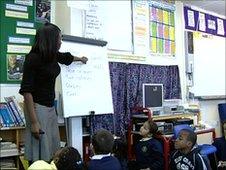Sex education call for primary pupils
- Published

Health advisers want sex education lessons throughout the school years
Primary school pupils in England should be taught about sex, relationships and alcohol, say health advisers.
The National Institute for Health and Clinical Excellence (NICE) wants primary and secondary school lessons appropriate to children's ages.
Sex education is "more effective if it is introduced before young people first have sex," says the health watchdog.
The advice on alcohol would be intended to help young people to avoid binge drinking.
Sex education for younger pupils has proved controversial.
Early advice
The previous government had put forward plans for compulsory sex and relationship education within the curriculum, but this failed to become legislation before the election.
The coalition government is now preparing its own plans for the curriculum.
This draft guidance from NICE says that there should be good quality lessons in sex and relationships for all pupils from primary school upwards.
But it says this sex and relationship education should be "sensitive to diverse cultural, faith and family perspectives" - and for young children it should be about "the value of friendships and having respect for others".
It says that 40% of young people have rated their sex education as poor or very poor - and that improving sex education will help young people to make healthier choices.
The health advisers argue that such lessons in personal, social, health and economic education (PSHE) should build up from an early age, creating awareness before children make their choices.
Drinking warning
"We also know education about sex and relationships is more effective if it is introduced before young people first have sex," says Gillian Leng, deputy chief executive of Nice.
The guidance also emphasises the importance of reassuring parents that sex education does not increase "the likelihood of sexual experimentation" - but instead that it gives young people the confidence to delay sex.
There are also calls for children to be taught about alcohol at an early age, as children grow up surrounded by advertising and images of alcohol.
"For most children, attitudes to alcohol start to develop long before they begin to drink," says Mark Bellis, director of the Centre for Public Health, Liverpool John Moores University and a member of the development group.
"Parental drinking, advertising and sponsorship ensure that children can grow up in environments steeped in references to alcohol.
"Even at an early age, children require a basic understanding of alcohol, the part it plays in society and the dangers relating to its use," said Professor Bellis.